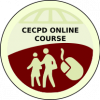-
Your Invitation to Play: The Wonder of Loose Parts
- Your Invitation to Play: The Wonder of Loose Parts - $20.00
-
Entry Level Child Care Training (2025)
There is no excerpt because this is a protected post.
-
Infant Mental Health
- Infant Mental Health - $20.00

-
Hope the Big Idea
There is no excerpt because this is a protected post.
-
Youth Work Methods

-
Literacy In Action: Learning to Read through the Environment
- Literacy In Action: Learning to Read through the Environment - $25.00
4 clock hours (0.4 CEUs) - Concepts of print refers to children's knowledge of the functions of print and how print works. In order to understand how print works children should be exposed to print concepts on a daily basis. Print concepts can be used with all age groups.
-
Literacy In Action: Shared Reading
- Literacy In Action: Shared Reading - $25.00
4 clock hours (0.4 CEUs) - Shared reading is a classroom strategy in which a teacher reads a book with enlarged print and encourages children to read along on parts they can remember or predict. Shared reading models the reading process and draws children's attention to print concepts and letter knowledge.
-
Literacy In Action: Alphabet Knowledge
- Literacy In Action: Alphabet Knowledge - $25.00
4 clock hours (0.4 CEUs) - When alphabet knowledge is embedded into everyday instruction, children will be able to name and write alphabet letters, recognize letter symbols in print, and know that letters have sounds. Laying this foundation will ensure that children will have the necessary literacy skills to build upon for future reading success.
-
Literacy in Action: Creating Literacy Rich Environments
- Literacy in Action: Creating Literacy Rich Environments - $25.00
4 clock hours (0.4 CEUs) - A literacy-rich environment is an environment that emphasizes the importance of language and literacy (language, print awareness, alphabet knowledge, writing, and phonological awareness) in the learning of all students and is embedded throughout the entire classroom. A literacy-rich environment is an environment in which appropriate materials have been selected in order to facilitate language and literacy opportunities for children.
-
Preventing Obesity and Promoting Wellness
- Obesity Awareness - $45.00
14 clock hours (1.4 CEUs) - Preventing obesity and promoting wellness in early childhood.